Review of Verdi: Nabucco
Introduction
Here`s a quick summary of the story: Verdi`s opera opens in ancient Jerusalem, as King Nabucco of Babylon, whose daughter Fenena is a hostage to the Jews, invades and sacks the Jewish Temple. Installed by Nabucco as Regent of Jerusalem and inspired by her love for the Jew Ismaele, Fenena converts to Judaism and frees the Jewish prisoners. The slave Abigaille, who claims to be Fenena`s sister, also loves Ismaele and masterminds a vengeful plot to imprison Nabucco and steal the crown of Jerusalem for herself. In his cell, Nabucco dreams that Fenena is about to be executed, but he escapes in time to free her and also converts to Judaism, as a repentant Abigaille poisons herself.
All this takes place in four acts, spanning around 2-hours, and has a fair few twists and turns. Read on for a breakdown of all four acts (contains spoilers), or skip to the next section.
• Act I
In the Temple of Solomon in Jerusalem, the Israelites bewail their fate: Nabucco (Nebuchadnezzar), king of Babylon, has attacked them with his hordes and is desecrating the city. As they offer prayers, Zaccaria (Zacharius), their high priest, enters with his sister, Anna, and Nabucco`s daughter, Fenena, whom the Jews hold hostage. He counsels his people to be steadfast, as peace is within their reach, and reassures them that the Lord will not forsake them. Ismaele, nephew of the king of Jerusalem and leader of the military, comes in with soldiers to say Nabucco is sweeping all before him. Zaccaria hopes for a miracle and turns Fenena over to Ismaele for safekeeping.
When the others leave, following a hymn, we learn that Ismaele and Fenena are in love, having met in Babylon when he served there as ambassador. Even then they had a difficult time, because her jealous sister, Abigaille, loved Ismaele too. As they talk, Abigaille bursts in wearing warrior garb and leading a band of Babylonians (disguised as Hebrew soldiers) to occupy the temple. She greets Ismaele with scorn, and then privately tells him he can save his people and earn a new kingdom if he returns her love. Saying he cannot, he offers to forfeit his life for his people, while Fenena prays to the God of Israel to shield Ismaele. The Hebrew crowd reappears, frightened because Nabucco is approaching. As the conqueror enters the temple, Zaccaria confronts him, denouncing his blasphemous arrogance and threatening to stab Fenena. But Ismaele holds back Zaccaria`s blow and delivers Fenena to her father. As Zaccaria and the other Jews revile Ismaele, Nabucco orders the temple looted and burned.
• Act II
In Nabucco`s palace in Babylon, Abigaille has found a parchment that could cause her ruin, since it certifies that she is not Nabucco`s daughter but the child of slaves. She swears vengeance on Nabucco and his appointed heiress, Fenena, but wistfully reflects that the love she felt for Ismaele could have changed her life. The High Priest of Baal comes to say that Fenena has freed the Hebrew prisoners. Because of her treason, the religious authorities have decided to offer Abigaille the throne instead, telling the people that their king has fallen in battle. She rejoices that the daughter of slaves will now have everyone at her feet.
Elsewhere in the palace, Zaccaria prays for the ability to persuade the Babylonians to put aside their false idols. He will begin by converting Fenena, whose apartment he enters. Two Levites, sent for by Zaccaria, appear and are surprised to meet the outcast Ismaele. As they upbraid him, Zaccaria, accompanied by Fenena and Anna, pardons Ismaele, for he saved a fellow Hebrew-the newly converted Fenena. The aged palace adviser Abdallo rushes in to tell Fenena about the reports of the king`s death and to warn that her life is in danger. Before she can escape, the High Priest of Baal, followed by Abigaille and the Babylonian populace, proclaims Abigaille ruler and pronounces a death sentence on the Hebrews. When Abigaille demands the royal sceptre, Fenena refuses to yield it. At that moment, to the astonishment of all, Nabucco enters, takes the crown and places it on his own head. Everyone quakes in dread before the irate monarch, who announces he is not only king but god, having overthrown both Baal and Jehovah. As he tries to force Zaccaria and Fenena to prostrate themselves, lightning strikes him and knocks the crown from his head; it also renders him insane. Abigaille retrieves the crown.
• Act III
In the Hanging Gardens of Babylon, the High Priest of Baal and the populace hail Abigaille as ruler. The High Priest presses her to put the Israelites to death, but before she can sign the warrant, the dishevelled Nabucco wanders in, hoping to sit once more on his throne. Abigaille dismisses the others and explains to Nabucco that she is serving as regent, since he is not well enough to rule; she gives him the warrant, hoping to trick him into ordering his own daughter`s death. When she taunts him for lack of resolution, he signs. Then Nabucco remembers: what of Fenena? She too will die, retorts Abigaille. When Nabucco tries to find in his garments the document proving that Abigaille is an impostor, she confronts him with it and tears it to bits. Nabucco calls the guards but learns they are no longer his servants: their job is to keep him locked up. Reduced to pleading with Abigaille for Fenena`s life, he meets with stony adamancy.
By the banks of the Euphrates, the Hebrews are resting from forced labour. Their thoughts ascend "on golden wings" to their lost homeland. Zaccaria predicts they will overcome captivity and obliterate Babylon with the Lord`s help.
• Act IV
In his royal apartment, Nabucco awakens from a troubled sleep to hear voices outside calling Fenena`s name. He goes to the window and sees her being led to execution. Trying the door, he remembers he is a prisoner. Desperate, he kneels to pray to the God of the Hebrews for forgiveness, pledging to convert himself and his people. His reason returns, and when Abdallo and soldiers come to see why he is trying to force the door, he convinces them that he is his old self again. Crying for a sword, he rallies his followers to regain the throne.
In the Hanging Gardens, executioners stand ready to do away with Zaccaria and his flock. The old man hails Fenena as a martyr, and she asks the Lord to receive her into heaven, but Nabucco arrives and orders the statue of Baal destroyed. As if by supernatural powers, it falls of its own accord. Abigaille takes poison and confesses her crimes, urging that Ismaele and Fenena be reunited; dying, she prays to the God of Israel to pardon her. Nabucco tells the Israelites to return to their native land and rebuild their temple, declaring that he himself now serves Jehovah. The crowd acknowledges a miracle and renders praises to God.
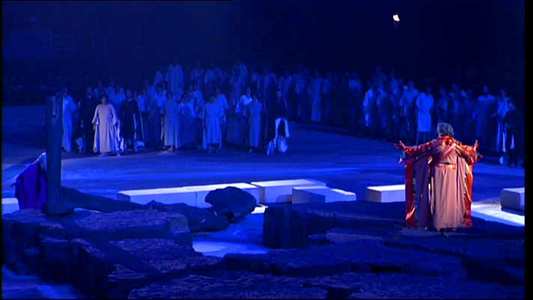
Video
Nabucco is presented with a good looking 1.78:1 widescreen enhanced video transfer. Shot on what looks like Digi Beta, the well-balanced colour and contrast come through really well. There`s marginal grain and edge enhancement creeping in however, and this might be to do with the level of compression since there are two 5.1 soundtracks with 2.0 audio as well. Other than this, there are no defects in the picture and it`s pleasant to watch.
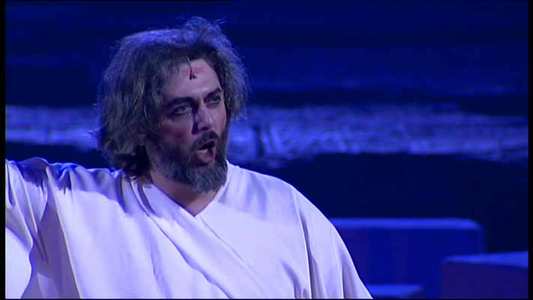
Audio
Nabucco gives you a choice of Dolby Digital 2.0, 5.1 and DTS 5.1 soundtracks to choose from. Staying away from the flat sounding 2.0 sound, the other two are very comparable with the DTS just having the edge. String instruments in the more subtle moments of the score were easier to pick out and just sounded clearer in DTS than Dolby Digital; this is only the kind of difference I noticed when I had my eyes closed. There`s not much in the way of LFE action, but it does support the main score when it starts to get busier. The surrounds seem to echo, at a very low volume, the same sound as the front pair. All in all it`s a clear, bright soundtrack and works well.
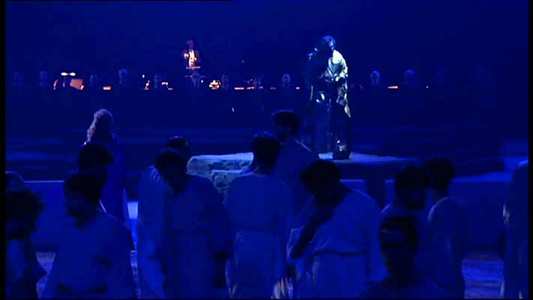
Features
None. Nabucco comes with English subtitles.

Conclusion
Nabucco was the opera that put Verdi well and truly on the map in terms of popularity throughout Europe; it was only his third one too and opened to a welcome audience at the La Scala in 1842. He wasn`t afraid to `borrow` from the likes of Victor Hugo or Shakespeare either. Verdi`s orchestral accompaniment backing up the wonderfully strong vocals is a delight to listen to. Gabriella Morigi as Abigaille demonstrates incredible presence with her fine voice, as does Michele Kalmandi in the title role. He gave a stirring performance as the king of Babylon, who`s been pushed over the edge and had his daughter turn against him; I thought it was a striking moment.
The quality of the production and music, from start to finish, is very good. This is the first time that I`ve seen any production of Nabucco, so I can`t compare it to any others. This one, at the Ahoy Arenain in Rotterdam, differs to most stage productions I`ve seen because all of the action takes place on a staging area in the centre of the arena. There`s more space to move about and the audience gets to see more too. Seeing this production in an arena setting with lots of people gives it a very grand sense of scale and adds to the enjoyment.
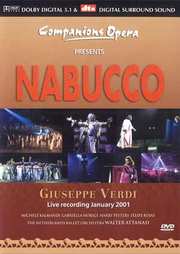
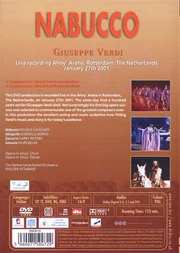




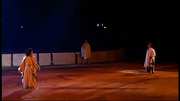
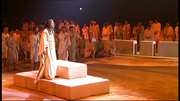
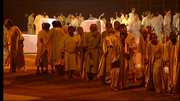
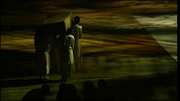































Your Opinions and Comments
Be the first to post a comment!